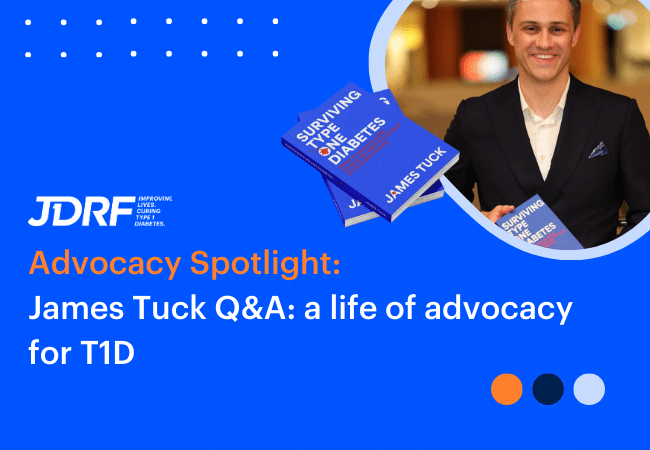Q&A: Caring for T1D beyond social distancing
Recently, we asked you to share any questions you had on type 1 diabetes (T1D), social distancing and beyond for Jane Overland, Co-Author of Straight To The Point: A Guide for Adults Living with Type 1 Diabetes and Diabetes Nurse Practitioner.
Turns out, many of you are curious about how coronavirus could affect you as a member of the T1D community, how to protect yourself properly and the best way to approach a return to the workplace and school as we navigate new outbreaks.
Here, we had Jane share her advice and expertise on these concerns and more. Read on to hear her thoughts on caring for T1D as we adjust to the new normal.

Do people living with T1D experience more complications from COVID-19? What other effects is the pandemic having on people with T1D?
We still don’t know for sure. It seems that some groups of people with T1D are more likely to experience complications from COVID-19. Older people, and those with underlying heart, kidney or respiratory conditions are at a bit of a higher risk, but overall the risk is still low.
Managing your T1D properly is still important – we know that people with high HbA1c (consistently above 86mmol/mol) are more likely to become seriously unwell from many viruses, including COVID-19.
It’s also important to note becoming unwell, whether that be with coronavirus or the flu, can dramatically increase insulin requirements. You might need to double your usual insulin intake to keep your BGLs in range. Failing to recognise this increased need can put you at risk of an emergency like diabetic ketoacidosis (DKA).
Another trend we’ve noticed that has been transforming insulin requirements during coronavirus is lifestyle changes. Social distancing has brought about a new way of living, including our tendency to be eating more and exercising less.
The advice is the same whether it’s coronavirus or any viral infection. To keep up the best possible T1D care, you need to:
- Step up your blood glucose monitoring
- Check for ketones if you’re not feeling 100%
- If your ketones are more than 0.6, reach out to a healthcare professional for some advice
As social distancing restrictions and advice continue to change, where can we go for support if an employer or school believes you’re unable to return or are a liability if you do so?
Organisations like JDRF Australia and Diabetes Australia are great sources of support, alongside your diabetes team. If you see an endocrinologist or attend a diabetes centre, we can certainly write letters to say that people are fit to return to work and school depending on the social distancing advice in your state. If you are knocked back after getting the opinion of a medical professional, then there are other avenues you can take to combat discrimination.
Is there any reason why we should be asked to provide a medical certificate when returning to work or school when restrictions are eased? How can we have a productive conversation?
Employers have a duty of care to make sure they keep their employees safe. There’s a great deal of mixed messages in the media, including claims that people with diabetes and those who are immunocompromised are at increased risk. We need to remember all employers don’t necessarily understand the difference between having T1D complications and living with the condition itself.
People living with T1D can reassure and educate their employers by having a letter or medical certificate saying they are fit to return to work. Rather than being put off when being asked to take extra action by our employer, we need to look at the bigger picture to keep ourselves and our wider community safe.
I am concerned about getting some upcoming check-ups as it’s getting harder to socially distance and I’m feeling vulnerable. Is it safe to access healthcare right now? Do you have any advice?
It’s very safe to access healthcare. In fact, it’s probably safer accessing healthcare facilities now than during regular flu season and there are stringent protocols in place at hospital, GP and pathology level. These protocols exist to keep everyone healthy. For example, if you need to have pathology done, if anyone is suspected of having coronavirus they’re seen at a different site and they’re accelerated through the process.
If you’re worried, there are other options to stay in contact – for example, telehealth. Don’t put your regular reviews off.
Should people living with T1D wear masks when we go out? Why/why not?
Wearing a mask or gloves will protect others if you’ve got a viral infection and prevent it spreading. However, they won’t necessarily protect you from others who are unwell. A virus can enter through the mucus membrane of the mouth and nose, but you can also get it through your eyes. Standard masks do not cover this area.
One of the reasons you see healthcare professionals wearing huge face shields is to protect their entire face.
Further, when healthcare professionals put masks on and take them off, we’re supervised by others to make sure we don’t breach the mask and increase our risk of an infection. If you are wearing a face mask or gloves, make sure you know how to remove them properly so you aren’t putting yourself at risk.
The best medical advice out there to avoid picking up and spreading coronavirus is these simple tips:
- Avoid crowds and public gatherings
- When you’re standing in line, face away from others to protect your eyes, nose and mouth
- Practice thorough hand hygiene
- Don’t touch your face
- Don’t share – whether this be a someone else’s coffee, a hand towel in the bathroom or a pen
These tips stand for avoiding any type of viral infection, not just coronavirus.

Should people living with T1D need to have a flu shot? Why/why not?
I’m a firm believer that we should all have flu shots. I’ve had my flu shot. If you become unwell with one thing, you’re more susceptible to catching something else.
If you’d like to read more about COVID-19 and T1D, visit our other resources: Summary of COVID-19/T1D Research from NHS, COVID-19 and Adults with T1D: Your Questions Answered and COVID-19 and Children with T1D: Your Questions Answered. You can read more about the research JDRF funds by clicking here and you can support JDRF’s vision for a world without type 1 diabetes by making a donation here. Donations made by 30 June are tax-deductible. You can also follow us on Facebook and Instagram for all the latest updates!



